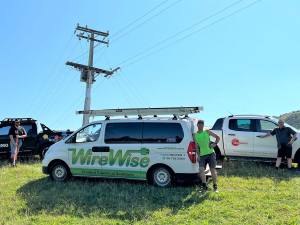Faster internet on the way
The Rural Capacity Upgrade programme, established in 2017, is on track to provide 30,000 rural homes and communities with faster, improved connectivity.
 Matt Harrison, managing director of Primo, with Neil Hocken of WireWise and Robin MacDonald of Linepower at the start of work on Primo’s ‘Boars Head’ tower site near the Kaitake Ranges on Tuesday.
Matt Harrison, managing director of Primo, with Neil Hocken of WireWise and Robin MacDonald of Linepower at the start of work on Primo’s ‘Boars Head’ tower site near the Kaitake Ranges on Tuesday.
The wireless broadband tower on the southern end of the Kaitake Range is getting a near million-dollar overhaul as part of the government’s Rural Capacity Upgrade (RCU) initiative.
Primo founder, Matt Harrison, says Boars Head is a key site for the company’s wireless broadband network into and around Coastal Taranaki, linking up with some of its other sites to provide coverage from Ōakura to Ōpunake.
“We called it Boars Head due to it being so close to the old Boars Head mine, now sitting abandoned from when our pioneering forefathers thought there was gold up in the hills,” Harrison says.
“The RCU project funding means we can put fibre up to the transmitter, add mains power and upgrade the wireless technologies for better coverage and capacity.”
He says Primo will be putting in new LTE technology which can get through trees better.
“Usually a wireless signal had to have a good line of sight between the transmitter and the antenna on people’s homes – LTE really opens more opportunities to link people up who may have patchy internet.”
Harrison says the revamp will cost approximately $1 million in total.
“We have been saving for this for a while now, and with the other half coming from the RCU fund we can fast track it and begin work immediately. I'm very excited!”
WireWise, Linepower and Subterrain Drilling are key partners in the project in getting power and fibre optic cable to the site to allow much greater capacity. The companies started work on the site on Tuesday and are expected to have the project completed before winter.
“Having fibre running to the site will give us more than 10 times the capacity than we’ve got now and that will give Coastal people better quality internet,” says Harrison.
“It also means we can do more things like broadcast radio stations from New Plymouth right around the Coast. We do that already for Te Korimako O Taranaki and there are plans for another station soon.”
Digital Economy and Communications Minister David Clark says upgrades to regional broadband will give rural businesses tools to be more innovative and productive.
“We can also improve health and safety for New Zealanders and their families through remote health consultations, facilitate remote learning and help maintain social and family connections,” Mr Clark says.
“By the end of 2024 around 47,000 rural households and businesses should experience faster internet speeds and better reception than they do right now.”
New tractor deliveries for 2025 jumped 10% compared to the previous year, a reflection of the positive primary sector outlook, according to the Tractor and Machinery Association (TAMA).
Entries have opened for two awards in the New Zealand Dairy Industry Awards (NZDIA) programme, aimed at helping young farmers progress to farm ownership.
Federated Farmers has confirmed interim chief executive Mike Siermans to the role.
Registrations are now open for the 2026 Ruralco Golf Classic, with all proceeds from the event set to support the Mid Canterbury Rural Support Trust.
Mating wrapped up last month at the across-breed Beef Progeny Test on Pāmu’s Kepler Farm in Manapouri.
Libby Judson is a keeper of memories from an age gone by. Tim Fulton tells her story.

OPINION: If the hand-wringing, cravat and bow-tie wearing commentariat of a left-leaning persuasion had any influence on global markets, we'd…
OPINION: With Winston Peters playing politics with the PM's Indian FTA, all eyes will be on Labour who have the…